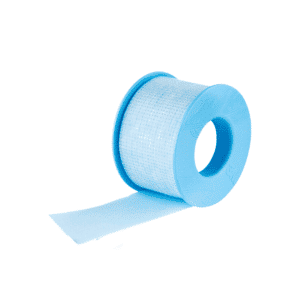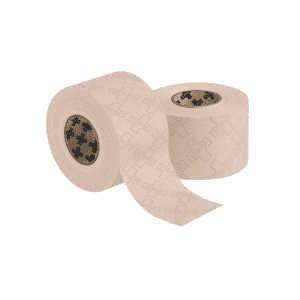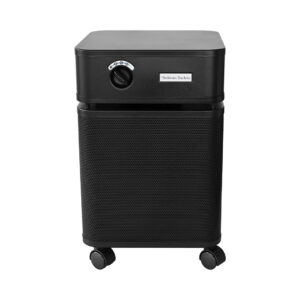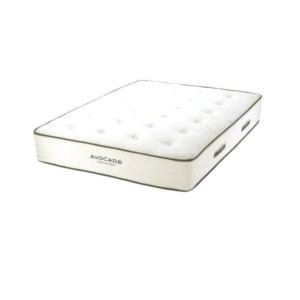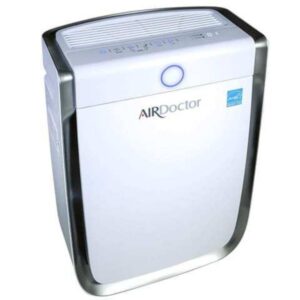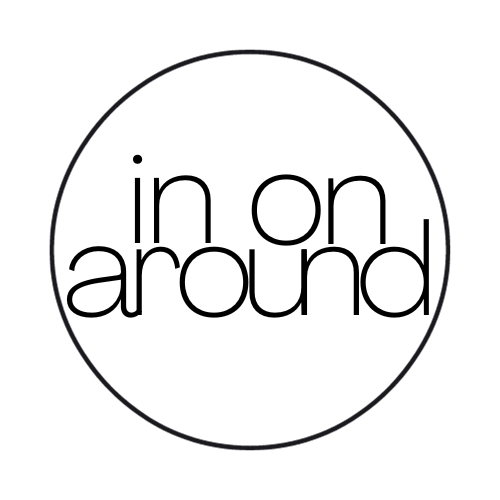Taping your mouth shut at night *may* just be the weirdest health hack there is, but it’s become a popular trend amongst wellness enthusiasts. Believe me, I thought it was super bizarre when I first heard about it too. Sleeping with tape on your mouth isn’t necessarily common… or normal. So, should you tape your mouth at night? Does mouth tape help with sleep? Are there truly benefits of mouth taping? Is this life hack legit?
Before you label this health hack as a scam, let’s talk about the true pros and cons of mouth taping.
Keep reading to learn more about it!
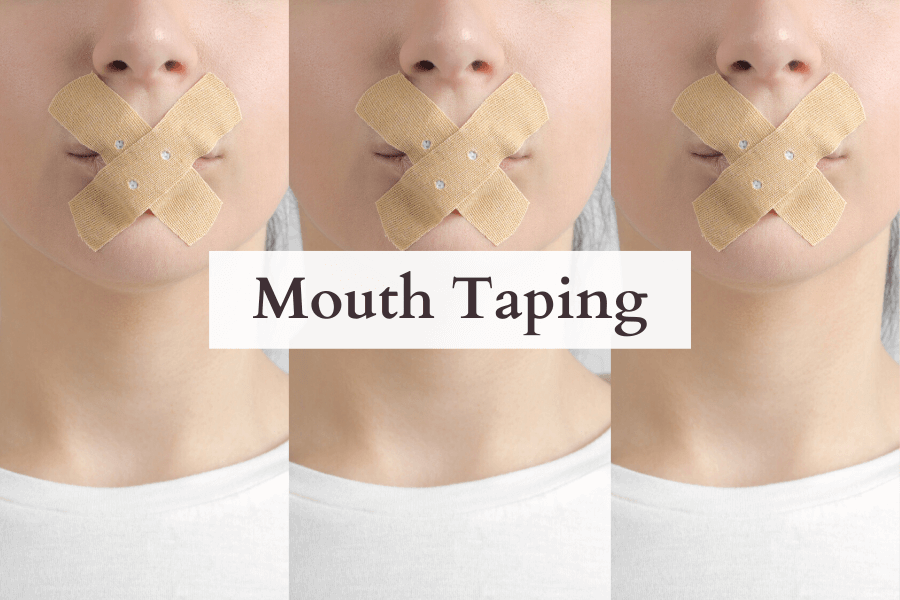
Note: This article contains affiliate links, meaning In On Around will make a small commission at no additional cost to you. This helps me maintain the site. As always, I value full transparency & only work with brands I love and trust.
What Is Mouth Taping?
Mouth taping involves taping your mouth shut with a skin-safe tape in order to encourage nose breathing during sleep. It’s usually pain-free and minimally invasive.
Mouth tape is porous! You stick the tape on both the top and bottom lips to temporarily bind or seal your lips shut. Mouth taping is sometimes mentioned in the Buteyko breathing technique (BBT), which is focused on slow, intentional breathing through the nose to improve asthma symptoms.
Sounds crazy? Maybe! But so many people swear by it. It’s becoming increasingly popular and the hashtag #mouthtape on social media has been trending.
Why Is Nasal Breathing Important?
Nasal breathing is very, very important for a number of reasons. This is why breathing through the nose is an innate process that we’re born with. Babies naturally breathe through the nose! Let’s dive into why…
1 – The Nose Filters The Air
First and foremost, the nose is a filter to the lungs. It’s our first line of defense against any pathogens that are in the air, like dust, pollen, bacteria, and some viruses. Nose hairs (called cilia) and mucus help trap these foreign particles. Nasal breathing also helps to humidify and moisturize the air. It warms up the air before it’s brought to the lungs. It’s more efficient than mouth breathing… hands down.
Breathing through the nose helps our bodies function optimally! Nasal breathing was also shown to potentially reduce the viral load and improve oxygenation in those with COVID-19. [1] It’s a great natural filter.
Cilia in the nose act as a natural air filter & humidifier.
2 – Contributes To Proper Facial Development
When a child doesn’t breathe from their nose, it can contribute to improper craniofacial development. Nasal breathing is a simple way to decrease the risk of facial deformations, high/narrow palate, and underdeveloped jaw. This is commonly called a “mouth-breathing face” and kids can develop flatter facial features.
Children with improper nasal breathing can also have a higher risk of sleep apnea, learning difficulties, slowed growth, and behavioral problems. [2, 3, 4] In fact, some scientists have also noticed that over half of children with ADHD may be breathing from their mouths – YIKES. [5]
Mouth breathing can lead to a “mouth-breathing face” or improper facial development.
3 – Prevents Certain Health Issues
Nasal breathing is key to preventing certain health conditions. In fact, mouth breathing has been linked to gum disease, gingivitis, yellowing teeth, misaligned teeth (malocclusion), an overbite, speech impediments, and an increase in heart attack risk.
About 50% of the western population have disordered sleep due to disordered breathing. [6]
About 50% of the Western population has a form of disordered breathing. [7]
4 – Produces Nitric Oxide
Most importantly, nasal breathing produces Nitric Oxide. Nitric Oxide is an essential molecule that’s produced by our body, like in our sinuses, which allows for oxygenated blood and nutrients to travel around the body. In fact, about 25% of our nitric oxide is made in our sinuses. [8, 9]
Let the nose stick to smelling and breathing, while the mouth talks and eats!
Mouth taping → Increased nasal breathing → Increase in Nitric Oxide → Improved health
Nitric Oxide Can Help…
- Improve memory and learning [10]
- Promote weight loss [11, 12]
- Relieve pain [13]
- Aid in blood pressure regulation [14, 15]
- Reduce heart disease risk [16, 17]
- Improve mental health issues, like anxiety and depression [18, 19]
- Regulate inflammation [20]
- Increase gut function, the gut microbiome, and immunity [21, 22, 23]
- Improve sleep quality, even potentially for those with sleep apnea [24, 25, 26, 27]
- Improve sexual function and decrease erectile dysfunction [28, 29]
- Impact posture [30, 31]
- Improve strength and endurance [32, 33]
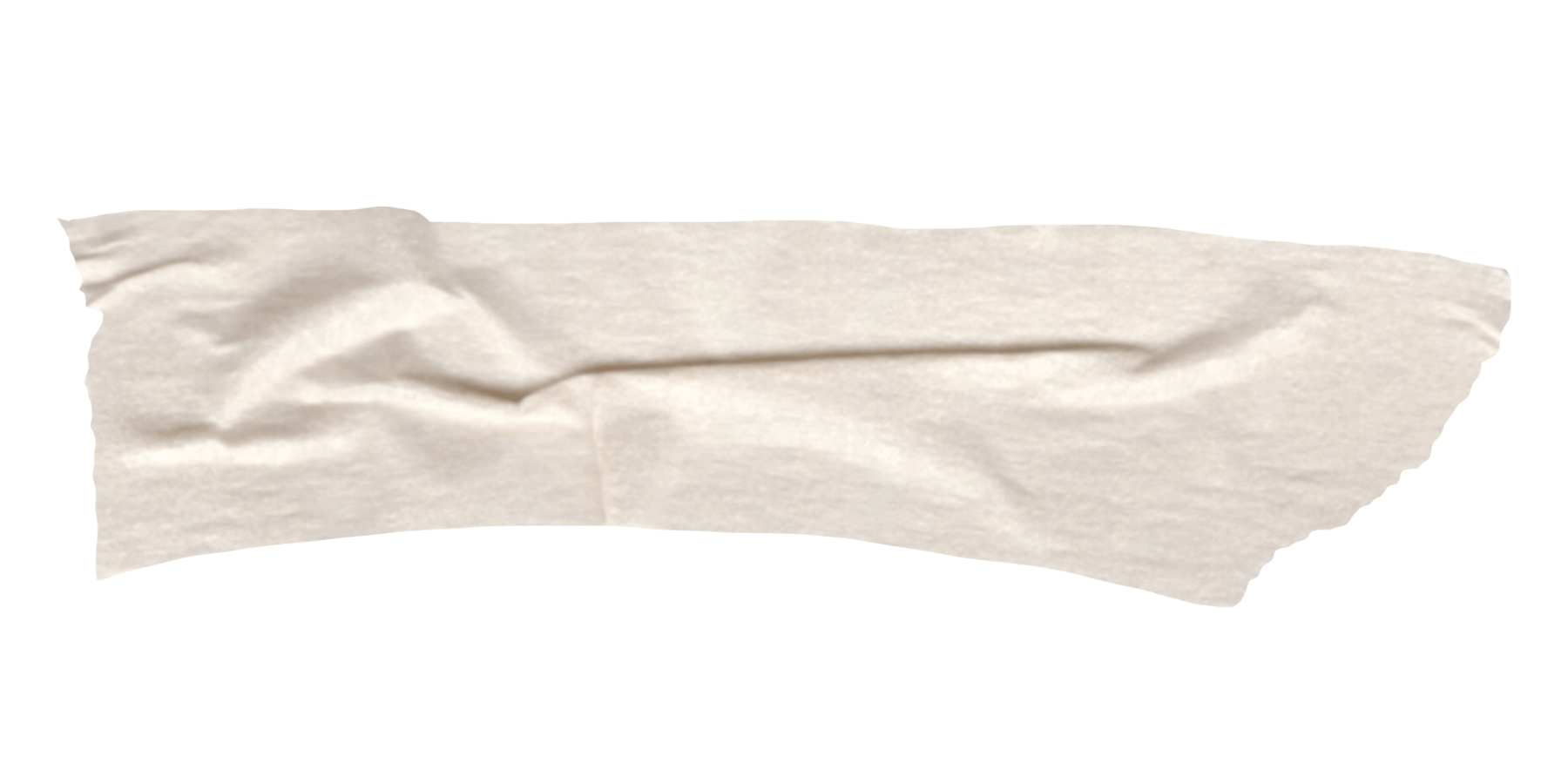
Misconceptions About Mouth Taping
Remember: the goal of mouth taping isn’t to 100% seal your mouth shut all night. That can be very dangerous if done incorrectly. You should be able to force your mouth open when needed. The real goal is to help your facial muscles relax so you start breathing out of your nose.
Mouth Taping Feedback
I asked my Instagram followers what their thoughts were on mouth-taping, and here are the top highlights:
- “Love it. Sleep so much better when using it. Definitely notice when I forget to sleep with it.”
- “Life changing. Cannot sleep without it at this point! Best sleep ever.”
- “Amazing! I sleep so much better. It is a quick, painless, and easy habit.”
- “Very positive experience. Been about a month, not waking up tired or anxious anymore!”
- “Definitely helps! I’m a mouth breather due to tongue thrust, so I use tape at night.”
- “My husband uses it and it decreases snoring and helps him sleep better.”
- “Mouth taping was a game changer for me. Do it practically every night.”
- “Wake up feeling more rested.”
I also saw a couple of comments on hesitancy. Someone said it “seems scary and dangerous,” while another one said, “I’ve heard great things, but terrified to try it.”
So to address these comments, let’s dive into the pros and cons of mouth-taping…
What Are The Health Impacts Of Mouth Taping?
Despite the lack of long-term scientific evidence (it hasn’t been studied extensively), mouth taping and nasal breathing can potentially lead to: [34]
- Deeper quality of REM sleep
- Better immune health
- Reduction of snoring
- Mouth tape helped cause nasal breathing, thereby changing the angle of the palate to reduce snoring and lapsed breathing.
- Prevent the need for a CPAP (continuous positive airway pressure machines) [35]
- Decrease in excessive nighttime thirst
- Reduction of bad breath
- Improved dental health, including the reduction of cavities
- Mouth breathing dries out your mouth and disrupts the oral microbiome and oral pH, thereby potentially leading to tooth decay.
- Imbalance in beneficial microbes in the mouth, which can lead to opportunistic pathogens and bacteria to thrive.
- Improvement of dry mouth or sore throat
- Reduces nighttime drooling
- Fewer asthma symptoms [36]
- Improvement in mental health symptoms
- Mouth breathing can lead to over-breathing, putting your body into fight or flight mode.
Although this hasn’t been confirmed yet scientifically, some people even claim to have a more restful sleep while using mouth tape. Much of this is attributable to the increase in nitric oxide production (as mentioned above). Mouth breathing is not a good look!
Keep in mind, there are very few long-term studies conducted on mouth taping. The evidence is anecdotal.
Is Mouth Taping Dangerous? Who Should Avoid Mouth Taping?
Mouth taping can be dangerous if done incorrectly. Firstly, it’s always best to try to determine the root cause of mouth breathing while sleeping. Sometimes the tongue, soft palate, or epiglottis can cause an obstruction. Enlarged tonsils or adenoids can also lead to mouth breathing. Mouth taping can act as a band-aid solution – it’s a symptom, not a root cause, so speak with a specialized myofunctional therapist.
Most importantly, mouth taping is not for everyone… and that’s okay! Of course, when putting anything over your mouth, there’s an increased risk of asphyxiation (if done improperly). You want to ensure it’s completely effortless to breathe out of your nose.
You should avoid mouth taping if you:
- Are sick, feeling stuffy or congested
- Suffer with a deviated septum
- Have small nasal passageways
- Suffer with nasal polyps or nasal obstructions
- Are suffering with allergies
- Have signs or symptoms of sleep apnea or use a CPAP
- Although mouth taping may help with sleep apnea, it’s always best to get a formal sleep study completed and talk to your medical provider before trying mouth taping.
- Have any sleep disorder
- Are pregnant or breastfeeding
- Live with uncontrolled epilepsy
- Have a vomiting-related illness or serious GERD
- Are a child (especially under the age of five)
- Have been drinking alcohol in excess
- Are anxious or claustrophobic about it
This is not an exhaustive list. Of course, you know your body best. If mouth taping is giving you more stress than anything, it’s best to skip it. Talk to your naturopathic doctor about your individual risk factors!
Mouth taping at night NOT for everyone! Use caution.
Is Mouth Taping Safe For Children?
No, I don’t recommend mouth-taping on children, unless you speak with your doctor first. Trust be told, most doctors won’t be familiar with mouth taping. Functional dentists may be a better resource.
Children under 5 years old or babies should NEVER mouth tape – the risks outweigh the benefits. It’s always best to err on the side of caution. Children can, however, tape around the mouth in an effort to re-train orofacial musculature.
While you can’t force a child to breathe out of their nose all the time, make sure you check their sleeping habits. If your child is mouth breathing at night, it’s always best to first speak with a myofunctional therapist.
About 10-25% of children mouth breathe. [37]
Does Mouth Taping Stop Teeth Grinding?
While mouth taping may not stop teeth grinding altogether, it may contribute to a reduction in teeth grinding. If you struggle with temporomandibular joint pain (TMJ), mouth taping may be able to help! Wearing a high-quality mouth guard can also help easy teeth-grinding symptoms and minimize snoring.
Best Tape For Mouth Taping
So if you’re ready to give mouth-taping a try, where should you buy some? It’s readily available online, like on Amazon! You want to use tape that’s sticky, but not TOO sticky where it’s hard to take off.
Here are some options:
- Gentle paper medical tape, surgical tape, sports tape, or first-aid tape, like 3M Nexcare tape (the most cost-efficient option and my personal favorite)
- Mouth-tape-specific brands, like:
Most pre-made mouth tapes are a gel-like consistency that is shaped to go over your full mouth. Most don’t leave a sticky residue on the lips after taking it off. Some pre-made brands have a small slit or vent for mouth breathing if needed, but personally, I find the opening to be too small.
In my opinion, it’s best to leave some room for mouth breathing. I prefer leaving the sides of the mouth tape-free. Just a tiny vertical piece of tape in the center of your mouth can work!
If you have facial hair, the medical tape is usually your best bet. If it’s too sticky (and rips out your hair), you can try sticking it to the back of your hand a couple of times to remove stickiness before applying it to the lips.
You can also tape the skin around your mouth (not on your mouth) to encourage the muscles to contract for nasal breathing. This is similar to the Buteyko Clinic method and can be used with Myotape or Kinesiology tape.
If you tape your mouth at night, place the tape vertically, not horizontally.
Mouth Taping Tips
Follow these best practice tips to have the best mouth taping experience:
- Avoid using too much lip balm or face oil around the lips, otherwise the tape may not stick.
- Try using mouth tape during the day! This can help you get used to it and train your face over time to keep your mouth closed.
- You can start with 10 minute during the day and work your way up over time. Allow your body to acclimate slowly. It may take some time to get used to!
- Don’t purse your lips too much while applying the tape. Just loosely tape the lips closed, with enough room on either side for emergency mouth breathing.
- Pursing your lips can cause unnecessary wrinkling and creasing in your skin.
- Never buy fragranced tape (… yes, that’s unfortunately a thing!)
- You can read more about fragrance here: Safe Fragrance 101 – What Is Natural Fragrance?
- Never use harsh tapes like duct tape, masking tape, or scotch tape. These can cause irritation or an allergic reaction.
- Don’t neglect your dental health! Apply it over your lips after brushing and flossing your teeth before bed.
- If you struggle with mouth breathing and bad breath, oil pulling may be able to help with some of those symptoms. You can read more about that here: Coconut Oil Pulling For Cavities
- If you’re sensitive to adhesive, always do a patch skin test first
Other Ways To Reduce Mouth Breathing
There are some other methods you can try to reduce mouth breathing!
- Work with a qualified naturopathic doctor, functional dentist, and/or myofunctional therapist to determine the root cause of mouth breathing or allergies. Keep your nasal passages clear!
- Myofunctional therapy can decrease symptoms of obstructive sleep apnea by about 50% in adults and 62% in children! [38]
- Throat and tongue exercises, like pressing the tip of your tongue on your top front teeth, and stretching your tongue can help! Work with your therapist to do these exercises.
- Try an anti-snoring chin strap
- This adjustable device can help to lightly clamp your mouth shut at night.
- Note: if you suffer from hair loss, this strap can irritate the hair shaft if it’s set too tight.
- Sleep on your side instead of your back
- Consider changing your mattress and pillow for proper spinal alignment
- To find non-toxic pillows, check out the In On Around Shop!
- To read more about the best non-toxic mattress brands, check out: The Most Organic, Safe, and Affordable Nontoxic Mattresses
- Try nasal strips
- Nasal strips may be able to improve nasal congestion and sleep quality. [41]
- If you suffer with insomnia, reduce your caffeine intake and follow proper sleep hygiene.
- Check out this article: Open When You Can’t Sleep! 18 Tips To Beat Insomnia
- Limit your alcohol consumption, especially before bed
- Check out this article: What Is The Healthiest Alcoholic Drink? Alcohol On Gut Health
- Quit smoking!
- Use a humidifier
- Keep a clean bedroom environment and use a high-quality air purifier to reduce airborne allergens
- To find the best air purifiers, check out: Best Air Filter Buying Guide
Another fun way to increase nitric oxide production is to hum! Particular types of controlled breath-holding can also lead to nitric oxide production.
Final Thoughts – Health Benefits Of Mouth Taping
So, mouth taping… sure, it’s weird, but it works. Of course, mouth-taping is not a commonly accepted practice at this time. It’s always best to talk to your doctor first before considering starting. However, there’s increasing popularity around the trend, with undeniable health benefits for sleep quality and dental hygiene.
But, should you try mouth-taping? That’s up to you and your medical provider. Don’t let anyone on social media push you one way or another, however, personally, I’m a big fan! I love to sleep and I’d do anything to continue to improve the quality of my sleep! This super simple hack is a game-changer and I’ll continue taping my shut at night for a good night’s rest.
⬇ Pin this “The Benefits of Mouth Taping” pic on Pinterest for future reference! ⬇
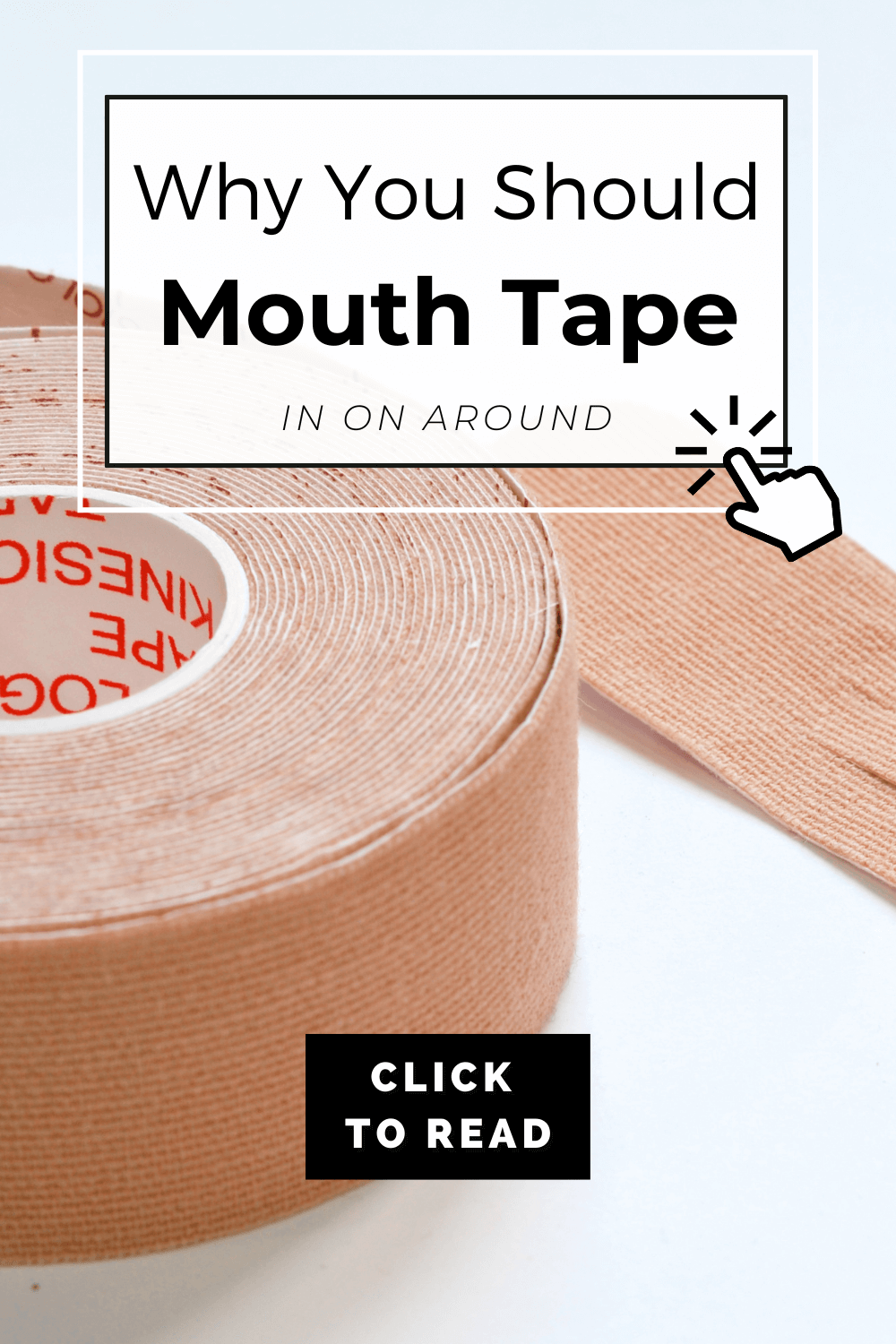
Frequently Asked Questions – Mouth Taping Health Benefits
Click on the below FAQs to learn more about the health benefits of taping your mouth shut at night!
What Is Mouth Taping?
What Are The Benefits Of Nasal Breathing?
Is Mouth Taping Dangerous?
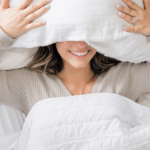
Mouth taping can be dangerous if done incorrectly. Firstly, it’s always best to try to determine the root cause of mouth breathing while sleeping. Sometimes the tongue, soft palate, or epiglottis can cause an obstruction. Enlarged tonsils or adenoids can also lead to mouth breathing. Mouth taping can act as a band-aid solution – it’s a symptom, not a root cause, so speak with a specialized myofunctional therapist.
Should You Cover Your Full Mouth When Mouth Taping?
Have you tried mouth-taping?
Let me know your thoughts and key takeaways in the comments below!
You can watch our web story here.
xoxo,

Want to read more? Check out my other articles here!
Other references on Benefits of Mouth Taping: Sleep Foundation, Dr. Mandee Johal, CNN, Dr Rosalba, Cleveland Clinic, NY Times, GQ, OSF Healthcare, The Sleep Doctor, Organically Becca, Buteyko Breathing Association, Healthline, Colgate, Everyday Health, Dr. Mark Hyman, Dr. Axe, Dentaly, Dr. Dexter, The Skinny Confidential, Somnifix, Medical News Today, Vero Beach Art of Dentistry, SKH, Sleep Advisor, CNET, Stylist
Copyright In On Around LLC 2022 ©. The statements made on this website have not been evaluated by the FDA (U.S. Food & Drug Administration). They are not intended to diagnose, treat, cure, or prevent any disease. The information provided by this website should not be used as individual medical advice and you should always consult your doctor for individual recommendations and treatment. The information contained in this site is provided on an “as is” basis. Related to this site, there are no guarantees of completeness, accuracy, usefulness, or timeliness. In On Around LLC assumes no responsibility or liability for any errors or omissions in the content of this site.

